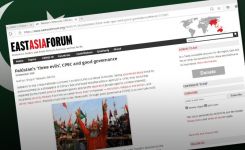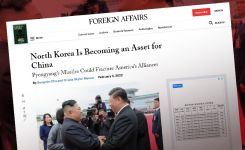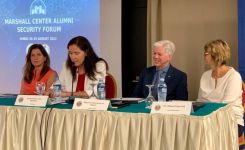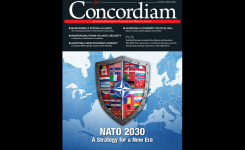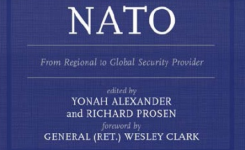Security Studies
New Marshall Center Perspectives Article on the Impact of COVID-19 on Terrorism and Counterterrorism
Marshall Center Professor James K. Wither published his latest article in Perspectives detailing his findings on a recently completed PTSS Virtual Global Alumni Community of Interest Workshop that examined the impact of the COVID-19 pandemic on Terrorism and Counterterrorism. You can access...
New OpEd looks at Pakistan and good governance
Professor Shyam Tekwani’s latest OpEd entitled “Pakistan’s ‘three evils’, CPEC and good governance” was recently published by the East Asia Forum. According to Tekwani, “Setbacks to the China–Pakistan Economic Corridor (CPEC) continue to mount, having spluttered along since its announcement...
New Paper Urges Southeast Asian States to Strengthen National Biodefense Strategies in the Face of Emergent Infectious Diseases
The threat of emergent infectious diseases to global health security is a constant concern, and Southeast Asian (SEA) countries have been particularly vulnerable to such diseases due to their geographic location, population density, and limited resources. With the recent outbreaks of COVID-19...
New Report on Central American Instability
July 14, 2016 Intelligence fusion centers may be the type of security apparatus that countries in the Northern Triangle need to combat organized crime according to Dr. Thomas Bruneau. In the most recent Perry Center Occasional Paper, Dr. Bruneau, a distinguished Professor Emeritus of...
New research article about North Korea’s economic reform and opening policies
Professor Sungmin Cho’s latest peer-reviewed article entitled “Why North Korea Could Not Implement the Chinese Style Reform and Opening? The Internal Contradiction Between Economic Reform and Political Stability.” was recently published by the Journal of Asian Security and International...
New Transatlantic Security Jam Report Online Now
Garmisch-Partenkirchen, Germany, September 2020- A newly issued report: Transatlantic Security: Securing the Post Covid Future provides recommendations for national, EU and NATO decision makers for responding to security challenges in a Covid and post Covid world. The report and its seven key...
New Vuving OpEd on China’s Role as a Peacemaker
“Ukraine shows how China will not get far posing as a peacemaker” is a new OpEd by Alexander Vuving forNikkei Asia. According to Vuving: “In offering its Ukraine peace initiative, China is capitalizing on the world’s hopes for bringing the conflict to an end and restoring stability to...
North Korea Is Becoming an Asset for China
“North Korea Is Becoming an Asset for China” is a new article by Dr. Sungmin Cho for Foreign Affairs magazine. Co-authored with Oriana Skylar Mastro, the article discusses the latest round of missile testing by North Korea and its potential impact on US alliances with Japan and the Republic of...

Officials from more than 30 Nations Meet for Africa Center’s Annual Senior Leaders Seminar
More than 50 senior officials from 36 African countries attended the opening of the Africa Center for Strategic Studies (ACSS)’s Senior Leaders Seminar on June 17, 2013, in Arlington, Virginia. The opening included keynote remarks by Ms. Amanda J. Dory, Deputy Assistant Secretary of Defense...
Ohrid Alumni Security Forum
After a three-year absence due to the COVID-19 pandemic, the Marshall Center is delighted to be back in person for the tenth anniversary of the Ohrid Alumni Security Forum, in partnership with our North Macedonia Alumni Association with further support from the NATO Public Diplomacy Division...

OpEd: Japan's New Security Policies
For the past decade, Northeast Asia has experienced dramatic changes. China’s rapid economic growth has been accompanied by an equally rapid rise in its military spending and a willingness to engage in coercive diplomacy. North Korea too has become increasingly belligerent and willing to...
OpEd: Making the Case for a More Robust Regional Security Architecture in the Asia-Pacific
"Now, there are a lot of folks, a lot of skeptics, who often downplay the effectiveness of multilateral action. For them, working through international institutions like the U.N. or respecting international law is a sign of weakness. I think they’re wrong…I believe in American...
Pacific Summit is Biden’s Chance to Demonstrate U.S. Soft Power
“Pacific summit is Biden’s chance to demonstrate U.S. soft power” is an opinion article written by DKI APCSS faculty memberAlexander Vuvingand published in September 2022 on Nikkei Asia. This article introduces how the US is beginning to work in the Indo-Pacific region again and reach out...
Pacific Trident III: The Strengths and Weaknesses of the U.S. Alliance System Under Gray Zone Operations
“Pacific Trident III: The Strengths and Weaknesses of the U.S. Alliance System Under Gray Zone Operations” is the latest paper by DKI APCSS Associate Professor John Hemmings. The paper looks at how tabletop exercises (TTX) are used to train participants on crisis management. The TTX,...
Pakistan can help win peace in Afghanistan, but only once it’s stable and secure itself
Shyam Tekwani has a new opinion piece in the South China Morning Post called “Pakistan can help win peace in Afghanistan, but only once it’s stable and secure itself.” Tekwani discusses Pakistan’s roadmap to peace in Afghanistan, its own internal challenges, and the opportunity to build an...

Parler de la sécurité sans les jeunes? Pas possible!
Le Centre d’études stratégiques de l’Afrique et ses collègues du Département de la Défense des E.U. ont assisté hier à l’Exposition du YALI Mandela Fellowship pour représenter le Département. Par le biais des questions, nous avons invité les fellows à réfléchir sur les liens entre leur travail...
Partial per Concordiam edition available online!
Welcome to the latest per Concordiam partial edition! Seventy-two years after NATO’s founding, the Alliance is busy adapting to a changing security environment. Preparations are well underway to adopt a new NATO Strategic Concept and have it endorsed at the NATO summit in Madrid this week. The...
Partnership for Peace Consortium (PfPC) Call for Papers!
The Partnership for Peace Consortium has issued a call for article submissions for the quarterly academic journal "Connections". Please see below for details on themes and submission dates: NATO's adaptation to new challenges, Open Continuously Hybrid Warfare, Deadline: 10 December...
Partnership for Peace Consortium members author chapter in new NATO book
Garmisch-Partenkirchen, Germany (August 31, 2015) – NATO constantly evolves to an ever-changing security landscape, and the Partnership for Peace Consortium’s defense education and defense institution building efforts are an important part of NATO’s evolution, detailed in the new book “NATO:...
Partnership for Peace Consortium Regional Study Groups hold planning meeting in Vienna.
Vienna, Austria, December 14, 2018 – Members of the Partnership for Peace Consortium (PfPC) Regional Stability in the South Caucasus Study Group (RSSC SG) and Regional Stability in South East Europe Study Group (RSSEE SG) met at the Austrian National Defence Academy in Vienna 13 to 14 December...
Pages

Institutionalizing Operations Analysis for Security and Defense in Bulgaria
This chapter presents Bulgaria’s experience in implementing a capacity-building research project. Entitled Operations Research Support to Force and Operations Planning in the New Security Environment, the project is sponsored by the NATO Science for Peace Program. The authors outline the project’s...

Beyond the RMA: Survival Strategies for Small Defense Economies
This chapter explores the particular challenges facing small countries in creating and sustaining defense industrial capacity. The author attempts to define "small" defense economies and explains how these small economies have new opportunities for international cooperation in the process of...

The Starlink Program: Training for Security Sector Reform in Armenia, Azerbaijan, Georgia, Moldova, Ukraine
This article outlines the Starlink program of the Center for European Security Studies. The program intends to help connect the beneficiary countries to the wider European security community by promoting reforms and democratic governance of the security sector. The authors describe Starlink’s focus...

Applying a New Management Model in the Joint Staff: An Executive Summary
This chapter reviews a longer study of an ongoing pilot program to implement a new public management model, the Super-Unified Customer and Cost Evaluation Strategic System (SUCCESS) framework at the US Department of Defense. The SUCCESS model is described and its application to the Joint Staff’s...

Assessing the Status of PAP DIB Implementation
This article outlines some considerations on how the achievements of the partners in the Partnership Action Plan–Defense Institution Building (PAP-DIB) can be assessed. The PAB-DIB was concluded in 2004 as the heads of state and government convened in the Euro-Atlantic Partnership Council (EAPC) at...

Civilians in Defense Ministries
This chapter examines the issue of civilians in a defense establishment. First, it presents the factors that drive the involvement of civilians in defense and points out some common perceptions, or rather misperceptions in Central and Eastern European countries. Next, it offers a classification of...

The Institutionalization of Security Risk Assessment
This chapter discusses the institutionalization of risk assessment within the framework of NATO’s Partnership Action Plan for Defense Institution Building (PAP-DIB). One of the Action Plan’s objectives is "effective and transparent arrangements and procedures to assess security risks and national...

PfPC, EAPC, and the PfPC Consortium: Key Elements of the Euro-Atlantic Security Community
This chapter outlines NATO's Partnership for Peace (PfP) main aims and assesses its achievements since 1998. The author identifies the Euro-Atlantic Partnership Council (EAPC) as one of the main drivers of PfP's success. He claims that nothing better exemplifies the flourishing of modern-day...

The PfP Consortium "Community of Experts" Approach to International Security Cooperation
This introductory chapter traces the historical development of NATO's Partnership for Peace (PfP). The author argues that while a major element of change over the first decade of the PfP Consortium's life has been NATO's adaptation to new security realities and the progressive improvement in its...

NATO and the South Caucasus: Armenia, Azerbaijan, and Georgia on Different Tracks
This chapter reviews activities between NATO and South Caucasus, placing a special focus on the 'Russian factor' within the region and the frozen conflicts in Azerbaijan and Georgia. It outlines Armenia's, Azerbaijan's and Georgia's principal positions toward potential NATO membership.

The PfP Consortium as a Change Management and Integration Tool: Ten Years of Experience
This chapter evaluates whether the goals of the PfP Consortium have been achieved 10 years after its inception. The author argues that, from the beginning, the Consortium has been an effective change management instrument that provided the opportunity for defense academies to work with civilian...

Whence and Whither the PfP Consortium?
This chapter discusses the most significant achievements of the PfP Consortium on the eve of its 10th anniversary as well as some of its shortcomings from the point of view of the author. The paper also outlines possible future areas that the Consortium should focus on, with Russia being...

The U.S. - Russian Dispute Over Missile Defense
The paper discusses the US-Russia dispute over deployment of US interceptors in Central Europe.

The Military Profession, Public Trust, and Public Interest
This paper presents an international comparative survey on trust and interest in the officer’s profession in Europe in the context of the changes following the end of the Cold War and the new types of deployments and in the current evaluations that European elites give of it. The paper is based on...



Energy Security and NATO: Any Role for the Alliance?
Since its inception, one of the top priorities of the North Atlantic Treaty Organization (NATO) has been maintaining the uninterrupted flow of energy resources, as it has always been directly linked to the organization’s operability and the security of its member states. For the Alliance, energy...


The Georgia Crisis: Implications for the Partnership for Peace
This article examines the South Ossetia crisis of August 2008 and its impact on NATO's Partnership for Peace (PfP). The author discusses implications of Russia's actions in the South Caucasus and addresses both the short- and long-term implications of the crisis in Georgia for the PfP.

The European Defense Sector and EU Integration
This paper reviews the history of the European integration process, with a focus on the political, economic and legal aspects relevant to security. First, it examines the specific aspects of the defense sector to explain why governments prefer cooperation to integration. The subsequent section...


